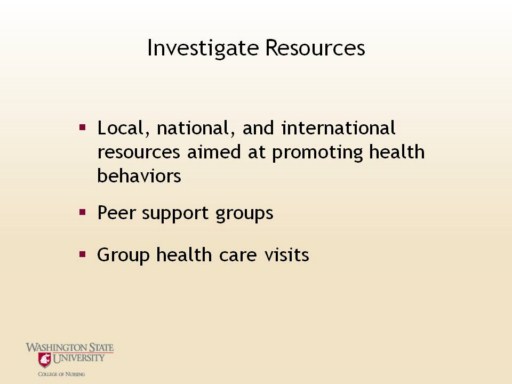| front |1 |2 |3 |4 |5 |6 |7 |8 |9 |10 |11 |12 |13 |14 |15 |16 |17 |18 |19 |20 |21 |22 |23 |review |
 |
Consider local, national, and international resources aimed at promoting health behaviors.
•Local
resources may include community gardens, exercise facilities, and
organizations specializing in health education such as diabetes
self-management classes.
•Countries
often have national non-profit or government-led organizations that
provide health promoting resources.
•Internationally,
organizations such as the World Health Organization have patient
education materials and clinician toolkits and resources.
•
(Note, instructors may want to investigate local and national resources and update this slide with specific examples).
One technique being used by health care systems and clinicians is offering group visits for patients with similar chronic diseases. During group visits, patients are generally offered service by a health care team or at least a few members of the health care team. Education and self-management discussions and recommendations are often provided. Patients and families benefit from hearing the concerns and the problem-solving techniques of others with similar conditions. Patients and their families can also provide one another with peer support, including emotional support during the group visit.
A chronic disease self-management support resource that is available in many countries and via the internet on the world wide web is the Chronic Disease Self-Management Program. |